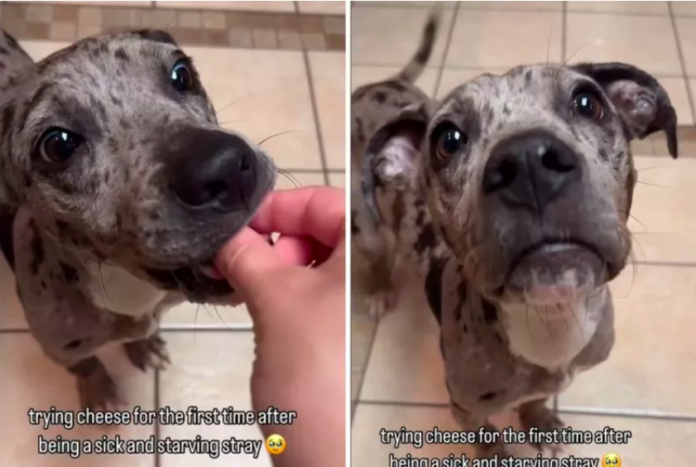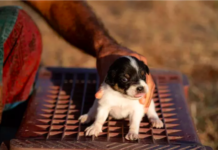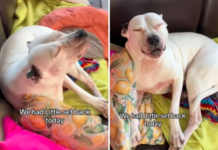Table of Contents
ToggleLast Updated on October 16, 2024 by Fumipets
Starving Stray Rescued: Gracie’s Heartwarming Reaction to Her First Bite of Cheese
In a heartwarming tale of resilience and second chances, a starving stray dog named Gracie has captured the hearts of thousands after experiencing her first taste of cheese. This moment, filled with joy and wonder, not only marks a significant milestone in Gracie’s recovery but also serves as a reminder of the love and care that can transform the lives of animals in need.
This article explores Gracie’s journey from the streets to a loving foster home and highlights the importance of fostering and rescuing stray animals.
From Stray to Beloved Companion
Gracie’s Early Struggles
Gracie’s story began on the streets, where she was found emaciated, with her ribs visible beneath her thin coat. Living as a stray, she struggled to survive, walking hesitantly and shaking from fear and hunger. Fortunately, her fate took a turn for the better when she was rescued and placed into a caring foster home.
- Signs of Malnourishment: Upon rescue, Gracie exhibited clear signs of neglect:
- Severe weight loss
- Visible ribs and bones
- Hesitant and fearful demeanor
The Healing Process
In her foster home, Gracie received the love and care she desperately needed. Her foster mom dedicated time to nurture her back to health, providing not just food but also comfort and companionship.
- Nutritional Support: Gracie’s diet was carefully planned to help her regain strength, including:
- Nutrient-rich food to promote weight gain
- Fresh water to keep her hydrated
- Occasional treats to encourage her trust and joy
A Memorable First: Cheese!
The Moment of Discovery
On September 22, a moment that would forever change Gracie’s perception of food occurred. Gracie’s foster mom offered her a small piece of cheese, and the dog’s reaction was nothing short of priceless.
- The Video Reaction: In a delightful Instagram video posted on @thriftedkittens.rescue, Gracie displayed a range of emotions as she tasted cheese for the first time:
- Curiosity: Gracie’s eyes widened as she received the cheese.
- Joy: Upon tasting it, her lip quivered in disbelief, as if realizing the world could offer such delightful flavors.
- Desire: After enjoying her first bite, Gracie looked at her foster mom, seemingly asking for more.
Social Media Sensation
The video quickly gained traction on social media, amassing over 2.7 million views, and resonating with dog lovers around the world. Viewers were enchanted by Gracie’s innocence and delight, leading to an outpouring of comments:
- Community Response: Some of the top comments included:
- “Her little brain is getting a major software update over that cheese.”
- “She’s not sure & needs another piece to tell.”
- “Awwww, she gets the cheese tax forever.”
The Nutritional Value of Cheese for Dogs
Why Cheese?
Cheese is a popular treat among dog owners due to its palatable taste and beneficial nutrients. Here are some key points regarding cheese:
- Health Benefits:
- Protein: Essential for muscle development and repair.
- Calcium: Important for strong bones and teeth.
- Vitamins: Contains vitamin A and B-complex vitamins.
Moderation is Key
While cheese can be a delightful snack for dogs, it is crucial to offer it in moderation due to its high-fat content. Excessive cheese consumption can lead to health issues, including:
- Weight Gain: Dogs can quickly gain weight if treated with too many high-calorie snacks.
- Obesity: Obesity in dogs can lead to a range of health problems, including diabetes and heart disease.
- Pancreatitis: A severe condition that can occur from consuming fatty foods.
Caution with Cheese Varieties
Not all cheeses are safe for dogs. Some cheeses may contain ingredients toxic to dogs, such as:
- Garlic
- Onions
- Chives
Always ensure the cheese offered to dogs is plain and free from harmful additives.
A Happy Ending
Just a few days after the heartwarming cheese moment, Gracie found her forever home, where she can continue to enjoy not only cheese but a life filled with love and care. Her new family is excited to provide her with the joy she deserves, including the occasional cheese treat.
Conclusion
Gracie’s journey from being a starving stray to becoming a beloved family member illustrates the incredible transformations that can happen through compassion and love. Her story serves as a beacon of hope for countless other animals in shelters, reminding us all of the importance of fostering and adopting pets in need. By sharing her tale, we inspire others to make a difference in the lives of animals who have faced adversity.
FAQs About Rescuing Stray Dogs
How can I help stray dogs in my community?
You can volunteer at local shelters, foster animals, or support rescue organizations financially or through donations of supplies.
What should I do if I find a stray dog?
Approach the dog calmly, check for identification, and if safe to do so, take the dog to a local shelter or contact a rescue group for assistance.
Is it safe to feed stray dogs?
If you choose to feed a stray, opt for healthy, dog-safe food. Avoid feeding human food that may be harmful.
What are the signs of malnourishment in dogs?
Signs include visible ribs, lethargy, poor coat condition, and behavioral changes like fear or aggression.
How can fostering help homeless pets?
Fostering provides animals with a loving environment, helping them adjust and become more adoptable while waiting for their forever homes.
For more heartwarming pet stories and tips on fostering and rescuing animals, visit Newsweek.


















